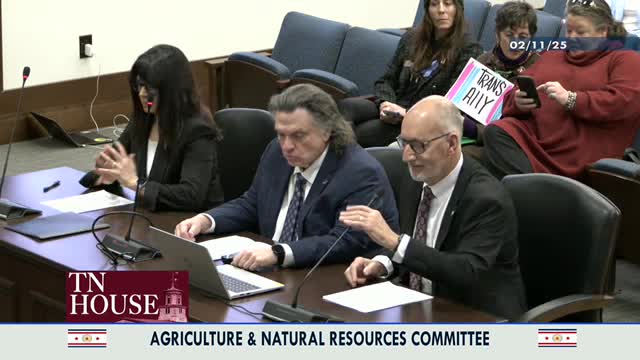Tennessee committee hears industry push for extended producer responsibility and recycling infrastructure
Get AI-powered insights, summaries, and transcripts
Subscribe
Summary
Manufacturers, recyclers and a recycling nonprofit told the House Agriculture and Natural Resources Committee that Tennessee is landfilling large volumes of recyclable material and urged adoption of extended producer responsibility (EPR) and regulatory fixes to expand local recycling infrastructure.
At a meeting of the Tennessee House Agriculture and Natural Resources Committee, industry representatives and recycling advocates on Monday urged the state to adopt extended producer responsibility (EPR) policies and to remove permitting and siting barriers so manufacturers can obtain more post-consumer feedstock from in-state recycling.
The presentations, delivered by Gary Cohen of the Tennessee Waste to Jobs Coalition, Donna Capecchi of Kaiser Aluminum, Don Haines of Florham USA, Cody Marshall of The Recycling Partnership and Katie Ravety Evans of the National Waste and Recycling Association, emphasized economic opportunities for Tennessee manufacturers, the limits of current local-government-funded recycling programs, and regulatory obstacles that hinder siting of material-recovery and composting facilities.
Why it matters: Presenters said Tennessee landfills contain hundreds of thousands of tons of recyclable packaging each year and that manufacturers in the state — including aluminum and tile producers — need reliable supplies of recovered material to expand domestic production, reduce imports and lower greenhouse-gas emissions associated with primary material production.
Committee members heard specific figures from presenters: Gary Cohen and Cody Marshall said Tennessee landfills contain roughly 900,000 tons of packaging waste each year that could be recovered; Cohen cited a reported statewide recycling rate of about 12 percent and participation around 47 percent. Donna Capecchi said the U.S. landfills nearly $1 billion worth of aluminum beverage cans annually and described Kaiser Aluminum’s need for more recycled aluminum to meet demand and reduce carbon intensity of production. Don Haines said Florham USA currently uses roughly 60 percent recycled material in its porcelain tile production (industrial and internal recycle) but has limited sources of post-consumer glass and would like to substitute more post-consumer glass for raw sand.
Presenters described EPR as a producer-funded system in which manufacturers pay fees to a producer responsibility organization (PRO) that works with an advisory board and the state agency—in Tennessee’s case, the Tennessee Department of Environment and Conservation (TDEC)—to create plans to expand collection and processing. “Producers would pay in based upon the size of their package,” Gary Cohen said, adding that fees can be structured to incentivize more recyclable or smaller packaging.
Cody Marshall of The Recycling Partnership said shifting the financial burden from local governments to producers would help communities that currently struggle to fund collection and processing. “Collecting recyclables and then processing it is the most expensive part of recycling and that’s on the shoulders of the local government,” Marshall said, urging a funding mechanism to capture materials for in-state manufacturing.
National Waste and Recycling Association vice president Katie Ravety Evans acknowledged the potential of producer responsibility but cautioned that details matter. She said several states are in the process of implementing EPR laws and that many programs remain in rulemaking and planning stages. She also pointed to permitting and siting constraints, invoking Tennessee’s so-called Jackson law as a barrier that can stop permitting without arbitration, and raised concerns about potential burdens on smaller producers and unresolved implementation details.
Committee members asked about costs, contamination, market demand and who would pay for collection and separation. Cohen and Marshall said under EPR producers would fund collection rather than relying principally on taxpayer funding; committee members noted that local governments and residents now shoulder collection costs. On market demand, presenters and trade representatives said there is demand for recovered aluminum, glass and plastics from Tennessee manufacturers and national recyclers when material meets quality and contamination standards.
Several lawmakers raised public safety and operational concerns. Katie Ravety Evans and committee members discussed lithium-battery fires and “wishful recycling” contamination at material-recovery facilities (MRFs). The National Waste and Recycling Association representative said industry is implementing new technologies (optical sorters, AI, advanced MRF equipment) and landfill-gas energy projects, but that permitting and siting rules currently limit where new MRFs, composting sites and certain recycling-processing facilities can be located.
No formal action was taken. Committee staff said they would distribute a video the presenters attempted to show and that the topic will return for further discussion. The committee adjourned without a vote on EPR or related statutory changes.
